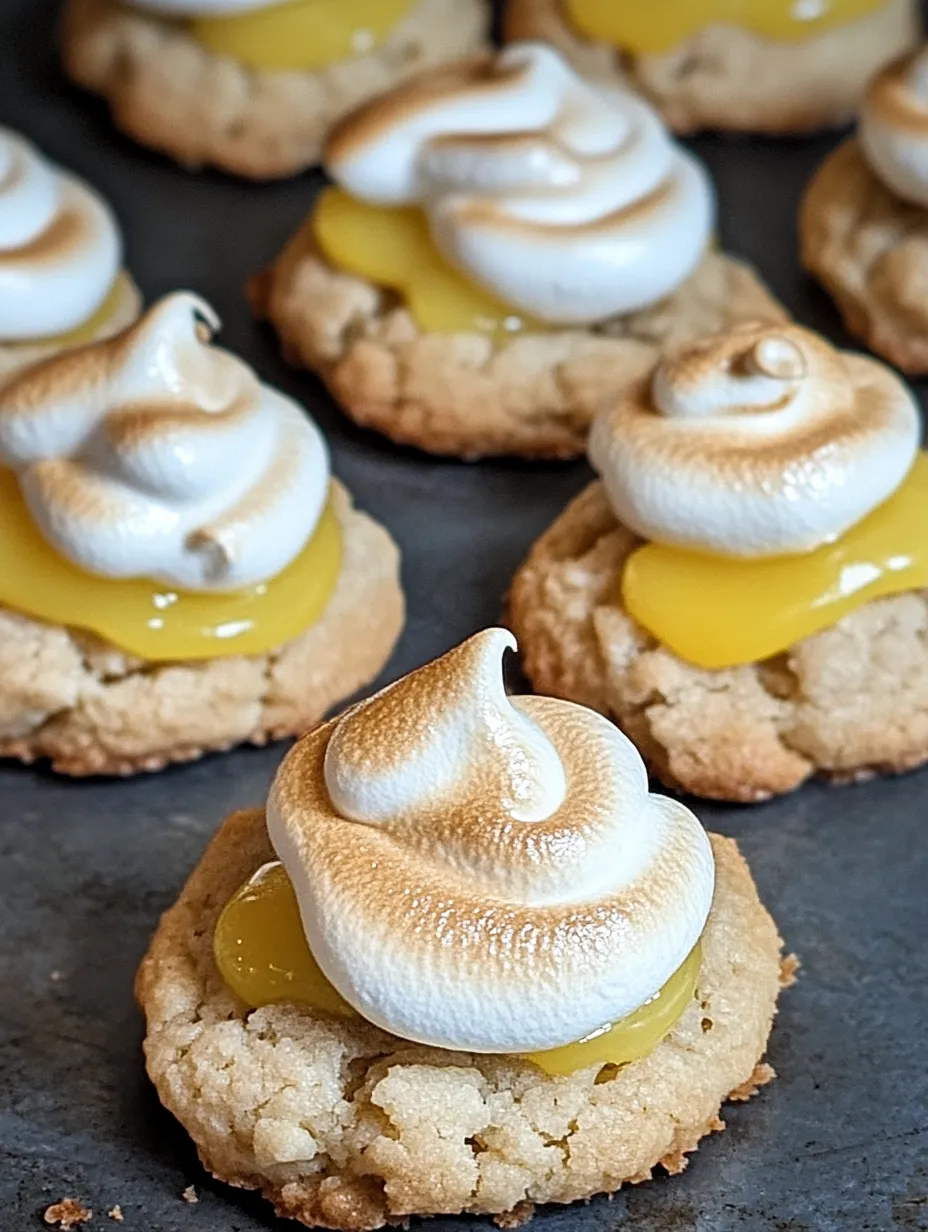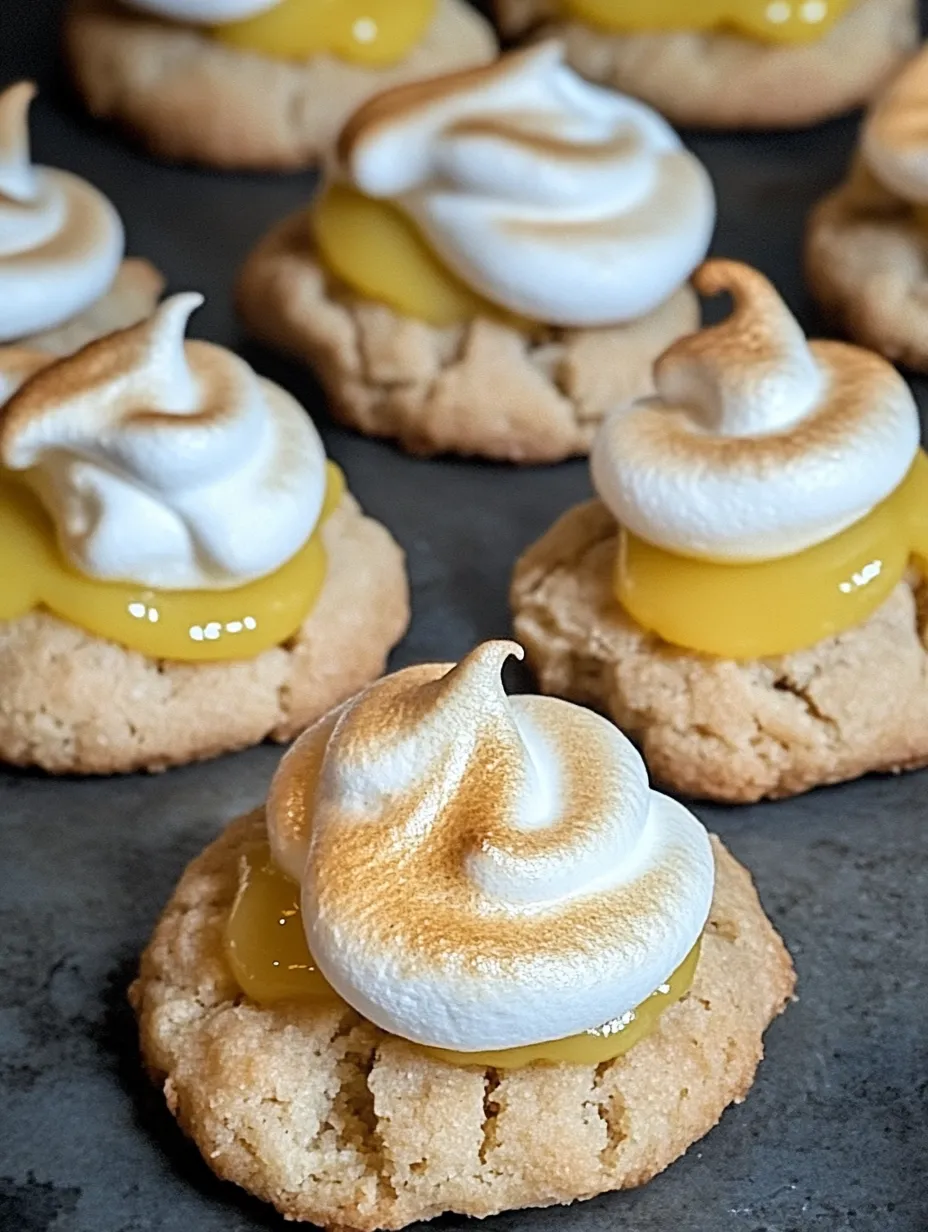 Pin it
Pin it
This lemon meringue cookie recipe transforms simple ingredients into cloud-like treats with a perfect balance of sweet meringue and tangy lemon. These light, crisp cookies melt in your mouth and make an elegant addition to any dessert table or afternoon tea.
I first made these cookies for my niece's baby shower and they disappeared within minutes. Now they're requested at every family gathering and have become my signature contribution to holiday cookie exchanges.
Ingredients
- Fresh lemon zest and juice: the star ingredients that provide bright citrus flavor without overwhelming the delicate meringue
- Egg whites: room temperature eggs separate more easily and whip to greater volume
- Granulated sugar: stabilizes the meringue and creates that crisp exterior and chewy interior
- Cornstarch: helps create that perfect melt in your mouth texture
- White vinegar: stabilizes the egg whites and ensures your meringue holds its shape
- Salt: enhances all the flavors and balances the sweetness
Step-by-Step Instructions
- Prepare your oven and equipment:
- Begin by preheating your oven to exactly 225°F. Line your baking sheets with parchment paper, not wax paper. Ensure your mixing bowl is completely clean and free of any grease, which can prevent proper whipping. I always wipe my bowl with a paper towel dipped in vinegar to remove any residual oils.
- Create the perfect meringue base:
- Start beating your egg whites on medium speed until they become foamy, resembling a light bubble bath. Add your pinch of salt, then increase the mixer speed to medium-high. Continue beating until soft peaks form when you lift the beaters they should create little mountains that gently fold over at the tips.
- Gradually incorporate sugar:
- This is the most crucial step. Add your sugar one tablespoon at a time, allowing each addition to fully incorporate before adding the next. This slow process might take 8-10 minutes but ensures your meringue will be stable and glossy. The mixture should transform from foamy to thick and glossy, and when rubbed between your fingers, should feel smooth with no sugar grains.
- Add stability ingredients:
- Once your meringue reaches stiff peaks, gently fold in the cornstarch and vinegar using a rubber spatula. Use a down-across-up-and-over motion, turning the bowl as you go. This maintains the air bubbles essential for light cookies.
- Incorporate the lemon flavor:
- Add the lemon zest and juice last, folding with just 4-5 strokes. The meringue will soften slightly with the acid addition, but that's normal. The mixture should still hold its shape well enough to pipe.
- Pipe your cookies:
- Transfer the meringue to a piping bag fitted with a large star tip. Pipe 2-inch diameter mounds onto your prepared baking sheets, spacing them about 1 inch apart. For a more rustic look, you can also use two spoons to create free-form cookies.
- Bake with patience:
- Slide your trays into your preheated oven and bake for a full hour. Resist the temptation to open the oven door during baking as the temperature drop can cause your cookies to crack or collapse.
- Cool completely:
- After baking, turn off the oven but leave the cookies inside with the door closed for at least 30 minutes, then slightly ajar for another 30 minutes. This gradual cooling prevents shocking the delicate meringue structure.
 Pin it
Pin it
My grandmother taught me to make meringue cookies, though her version was plain vanilla. I added the lemon element after traveling through southern Italy, where I fell in love with all things citrus. The brightness of fresh lemon transforms these from ordinary meringues into something truly special.
The Science Behind Perfect Meringues
The success of meringue cookies depends on creating a stable foam of egg proteins. When you beat egg whites, you're essentially unfolding the protein molecules and allowing them to reform around air bubbles. The sugar, added gradually, dissolves into the moisture from the egg whites and creates a syrup that coats these protein structures, stabilizing them during baking. The cornstarch and vinegar provide additional stability by preventing the proteins from bonding too tightly, keeping your meringues tender rather than rubbery.
Troubleshooting Common Issues
If your meringue won't reach stiff peaks, your bowl or beaters might have had traces of fat, or your egg whites contained bits of yolk. Even a tiny amount of fat will prevent proper whipping. Additionally, humidity can affect meringues dramatically. On very humid days, meringues may never fully dry in the oven and remain tacky. If possible, save this recipe for a day with low humidity.
Flavor Variations To Try
While the lemon version is my favorite, you can easily customize these cookies. Replace the lemon with lime or orange for different citrus profiles. For a more sophisticated flavor, add a teaspoon of culinary lavender to the lemon version. During the holidays, I sometimes add a quarter teaspoon of peppermint extract and some crushed candy canes folded in at the end. The basic meringue recipe serves as a perfect blank canvas for creativity.
 Pin it
Pin it
Storage Recommendations
Store your finished cookies in an airtight container at room temperature, placing parchment paper between layers to prevent sticking. They will stay fresh and crisp for up to one week. If they soften over time due to humidity, you can refresh them by placing them in a 200°F oven for about 10 minutes, then allowing them to cool completely before storing again.
Frequently Asked Questions
- → How do I achieve stiff peaks for the meringue?
Ensure your mixing bowl and whisk are clean and dry. Beat the egg whites on medium-high speed until foamy, then gradually add sugar until stiff, glossy peaks form.
- → Why is vinegar used in meringue cookies?
Vinegar helps stabilize the meringue structure, ensuring crisp and dry cookies while preventing them from becoming too delicate.
- → Can I use bottled lemon juice instead of fresh lemon?
Fresh lemon juice is preferred for a brighter flavor, but bottled lemon juice can work as a substitute if needed.
- → What’s the ideal baking temperature for meringue cookies?
For best results, bake meringue cookies at a low temperature, such as 225°F (110°C), to achieve a dry and crisp texture without browning.
- → How do I prevent the meringue from deflating?
Fold in ingredients like cornstarch and lemon zest gently and avoid overmixing to maintain the air in the meringue.
